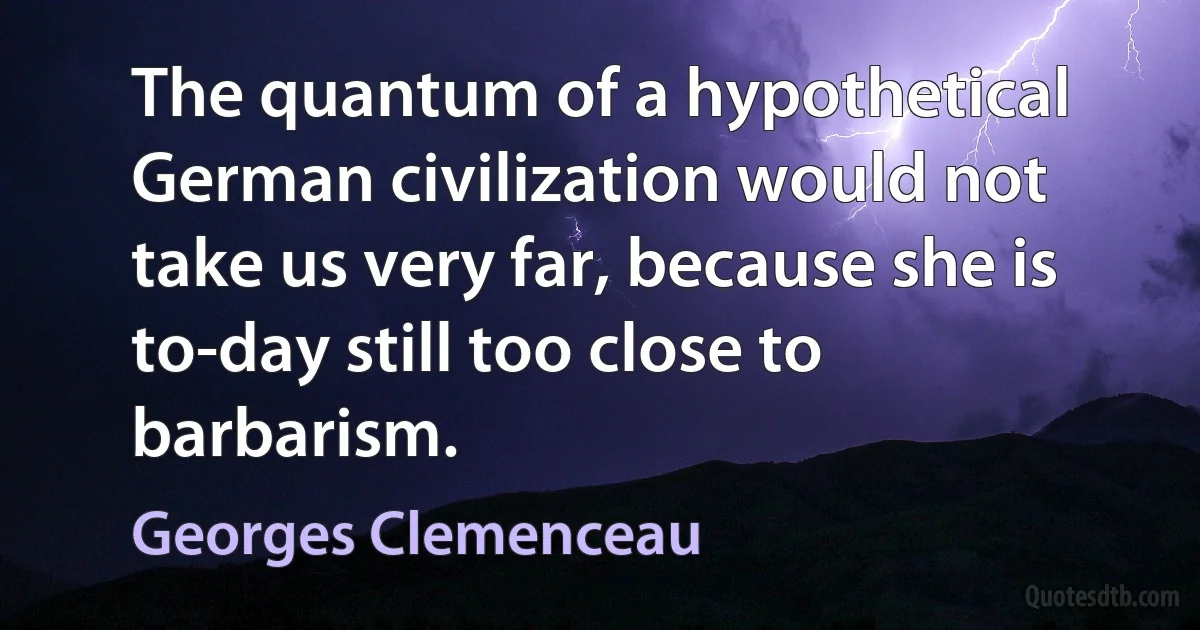Hypothetical Quotes - page 3
It was manifest that all persons who had learned that political science is an affair of conscience rather than of might or expediency, must regard their adversaries as men without principle, that the controversy between them would perpetually involve morality, and could not be governed by the plea of good intentions which softens down the asperities of religious strife. Nearly all the greatest men of the seventeenth century repudiated the innovation. In the eighteenth, the two ideas of Grotius, that there are certain political truths by which every state and every interest must stand or fall, and that society is knit together by a series of real and hypothetical contracts, became, in other hands, the lever that displaced the world. When, by what seemed the operation of an irresistible and constant law, royalty had prevailed over all enemies and all competitors, it became a religion. Its ancient rivals, the baron and the prelate, figured as supporters by its side.

John W. Campbell
The individual living in America as it was meant to be would be free to run his business as he wishes, associate with those he likes, dissociate from those he dislikes or disapproves; hire, fire, rent to or evict from, invest and disinvest, speak and misspeak at will. This hypothetical free man is at liberty to bruise as many feelings as he likes, so long as his mitts stop at the next man's face. So long as he harms nobody's person or property, our mythic man may live as he wishes to live.

Ilana Mercer
Poetry, as nearly as I can understand it, is a statement in words about a human experience, whether the experience be real or hypothetical, major or minor; but it is a statement of a particular kind. Words are symbols for concepts, and the philosopher or scientist endeavors as far as may be to use them with reference to nothing save their conceptual content. Most words, however, connote feelings and perceptions, and the poet, like the writer of imaginative prose, endeavors to use them with reference not only to their denotations but to their connotations as well. Such writers endeavor to communicate not only concepts, arranged, presumably, either in rational order or in an order of apprehensible by the rational mind, but the feeling or emotion which the rational content ought properly to arouse.

Yvor Winters
A frustrated or unhappy animal can do relatively little about its tensions. A human being, however, with an extra dimension (the world of symbols) to move around in, not only undergoes experience, but he also symbolizes his experience to himself. Our states of tension--especially the unhappy tensions -- become tolerable as we manage to state what is wrong -- to get it said -- whether to a sympathetic friend, or on paper to a hypothetical sympathetic reader, or even to oneself. If our symbolizations are adequate and sufficiently skillful, our tensions are brought symbolically under control. To achieve this control, one may employ what Kenneth Burke has called "symbolic strategies" -- that is, ways of reclassifying our experiences so that they are "encompassed" and easier to bear. Whether by processes of "pouring out one's heart" or by "symbolic strategies" or by other means, we may employ symbolizations as mechanisms of relief when the pressures of a situation become intolerable.

S. I. Hayakawa
Yes, I know bad bad people can also use the .fla files for dastardly deeds (the dreaded hypothetical "Nazi Porn Version” that always comes up at Q&A's). Bad bad people can use our shared Language and Technology for evil too, but I'm not going to constipate culture out of fear of imaginary worst-case scenarios. I'm confident much more good will come from this than bad, and that's motivation enough for me. It's Free Culture, baby. If programmers can tinker with the Free Software's source code, artists can tinker with Sita Sings the Blues‘ source files.

Nina Paley


